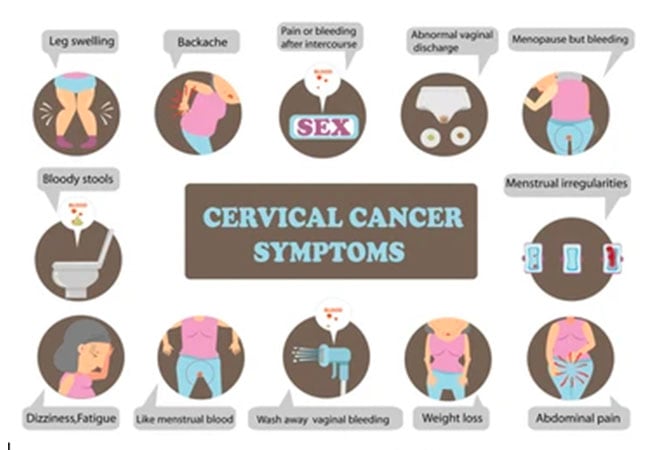
By Our Reporters
Janet Ogundepo
Gynaecologists have said bleeding during sex could be a sign of cervical cancer, advising women with such experience to go for proper medical evaluation.
Cervical cancer is the abnormal growth or change in the cells of the cervix, which usually results from a genital infection with the Human papillomavirus. Cervical cancer is the second most frequent cancer among women in Nigeria.
The information on Human papillomavirus by The Catalan Institute of Oncology and the International Agency for Research on Cancer stated that about 69.9 million women 15 years and above, were at the risk of developing cervical cancer.
The report further noted that every year 12,075 women were diagnosed with cervical cancer while 7,968 died of the disease.
A professor and Consultant Obstetrician and Gynaecologist at the University of College, Ibadan, Christopher Aimakhu told Reportr Door Healthwise in an exclusive interview that if a woman notices bleeding during sex, it could be a sign of cervical cancer.
The gynaecologist explained, “The reason is that the cervix has undergone some changes and just by the contact with the penis, she can start bleeding. It is called coital bleeding.”
“Bleeding could also happen when there was an injury to the hymen, forceful sex and a tight vagina, among others.”
Aimakhu, who is also the Secretary General of the Society of Gynaecology and Obstetrics of Nigeria, added, “Sexual position can make a woman bleed, a woman who is raped or forcefully made to have sex, vaginismus, uterine prolapse when there is a protrusion of the uterus into the vagina, you can have trauma and bleeding during sexual intercourse.”
Also, a Consultant Obstetrician/Gynaecologist at the Department of Obstetrics and Gynaecology, Federal Medical Centre, Yenagoa, Bayelsa State, Dr Ebiye Tekenah, stated that though there were various causes for bleeding during sex, it could be a sign of cervical cancer.
She advised, “The person affected should come to the clinic for proper evaluation which would include examination and investigations.”
A public health physician and founder of Quinta Health, Dr Babatunde Adewumi, stated that cervical cancer was a potential cause of bleeding during sexual intercourse.
He further stated that abnormalities or cancerous growth on the cervix may result in bleeding during or after sexual intercourse.
On other factors that could cause bleeding during sex, Adewumi explained vaginal dryness, infections, and rough or forceful sexual activity among others.
He said, “Vaginal dryness, which is insufficient lubrication during intercourse can lead to friction and minor tears. Also, infections such as sexually transmitted infections or other vaginal infections can cause bleeding. Rough or forceful sexual activity may cause tears in the vaginal or cervical tissues. Endometriosis, in some cases, the endometrial tissue outside the uterus can cause bleeding during intercourse.”
Adewunmi further stated that the growth of non-cancerous tissue on the cervix or inside the uterus and an infection affecting the reproductive organs can lead to bleeding.
“Hormonal changes, fluctuations in hormones, especially during menopause, can impact vaginal health. Cervical dysplasia, which is abnormal changes in cervical cells may cause bleeding. Some medications also may contribute to changes in vaginal tissue,” he noted.
Recently, the Federal Government introduced the HPV vaccine into routine immunisation and rolled out its free collection for young girls.
The HPV vaccine is effective in preventing infection with HPV types 16 and 18, known to cause at least 70 per cent of cervical cancers.
The Minister of State for Health and Social Welfare, Dr Tunji Alausa, recently urged young girls between the ages of nine and 15 to get the vaccine.
The SOGON Secretary General clarified that the vaccine “was best given to people who have never had sex or so many partners because HPV is a sexually transmitted infection. It is the causative agent of cervical cancer. Therefore, people who get the vaccine cannot have cervical cancer because they have been protected by the vaccine.”
Copyright Reportr Door
All rights reserved. This material, and other digital content on this website, may not be reproduced, published, broadcast, rewritten, or redistributed in whole or in part without prior express written permission from Reportr Door.
Contact: [email protected]
Leave a Reply